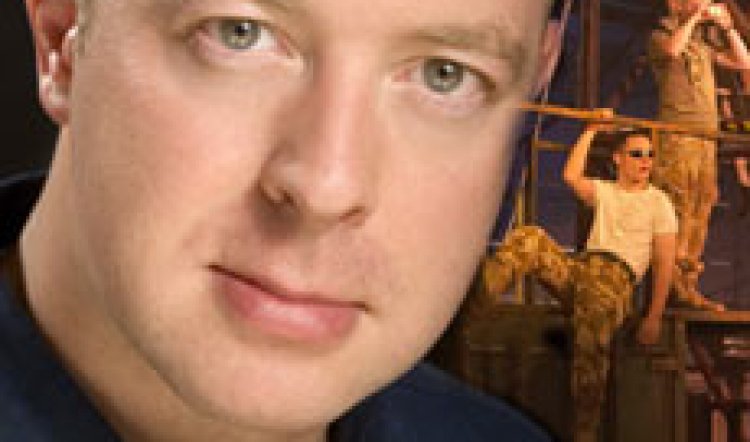
John Tiffany Interview
Black Watch, Carriageworks Bay 17, Redfern; January 10-26; 1hr 50mins, call 1300 723 or www.carriageworks.com.au/
John Tiffany, English director of the infant National Theatre of Scotland (founded 2006) has a style, which he describes as "not a style. I don't want to have a recognisable style. That would be boring. I want audiences to always expect something different. If that's a style, then that's my style."
Sydney Festival audiences are about to experience the no-style style with the much-anticipated arrival of Tiffany's unanimously acclaimed Edinburgh Festival production of Black Watch.
"People were curious but a little bit dubious, I think, when they knew it was about an army regiment. One of the most famous - the Black Watch - but still, a regiment and a play about war. What was going to be different or interesting about that?" Says Tiffany, recalling the initial responses to the idea of Gregory Burke's play.
And that reaction - which was not uncommon in Sydney when the play was first announced as part of the 2008 festival - is precisely what Burke and Tiffany have refused in their work together.
"It's about the dismantling of a community," says Tiffany. "When Greg started writing about these characters we realised it would be very easy to make quick judgments - to stereotype - and he refuses to judge or put words into their mouths, or invent anything."
The dismantling of the community that Tiffany talks about is a twofold tragedy: "The Black Watch was an incredibly tribal regiment, most regiments are, but in this case the Black Watch has always been drawn from Fife and Tayside. It's where Gregory Burke is from and he described it as virtually a family business. Fathers, sons, brothers, uncles - they all went into the Black Watch. It's what you did."
The irony for the Black Watch was that the British government chose to disband the 300-year-old regiment at the very moment when the young men needed their traditions and bonds as never before: they were 800 men being deployed in one of the most perilous regions of Iraq, to replace 4000 US Marines.
"It's unbelievable, in retrospect, that nobody thought through what it really meant," says Tiffany. "The tribalism of the regiment is what kept them together, kept them alive. And suddenly it was gone. At the same time, when they're killed the effect on their small communities is terrible. And what they faced - but didn't know it - was an enemy whose bonds of tradition and community were even tighter: the suicide bombers and insurgents. It was the first time these troops had come up against such an enemy and they had no training and no understanding. Five were killed in the first week."
[page]For Tiffany and Burke, the power of Black Watch is not that it's a "war play" but that It is a very personal story of a group of young men.
"It's the truth," says Tiffany. "We didn't know how theatregoers, and let's face it, middle class, cynical theatregoers, would react to being asked to go on a journey with these soldiers. But they really go with them and it's shocking.

 Part of the shock value is the classic one of realising the similarities rather than the differences between people. "The situation the soldiers found themselves in had some very interesting parallels: they were young men looking for identity, looking for their tribal roots - as so many suicide bombers are too. There is no voice given to the Iraqi insurgents in the play - that would be dishonest - but you can't not see the parallels."
Part of the shock value is the classic one of realising the similarities rather than the differences between people. "The situation the soldiers found themselves in had some very interesting parallels: they were young men looking for identity, looking for their tribal roots - as so many suicide bombers are too. There is no voice given to the Iraqi insurgents in the play - that would be dishonest - but you can't not see the parallels."
For Tiffany, the rocket ride with the company andBlack Watch has been a thrilling one. Last year he was interviewed by Lyn Gardner in The Guardian and made an observation that tells you a lot about his idea of theatre. He had been to see Nicholas Hytner's critically acclaimed production of Philistines at the National Theatre.
Was he impressed? Gardner asked. "Philistines was so beautiful," he said to her, "and it bored me to death. I never want to see another production where the rain splashes against a window and actors wander around in drab cardigans saying, 'I'm so bored.' I think Nicholas Hytner is doing a terrific job, but having to cater for that audience would suffocate me."
"That audience" is, of course, the middle-class subscribers so sought after by theatre companies, but which can so easily result in the artistic suffocation that Tiffany dreads. It's a trap that Sydney Festival director Fergus Linehan seems to have seen and sidestepped with this 2008 program in particular if the traditional middle-class festival-goers mutterings are anything to go by: Free-for-all opening night (grumble), war play from Scotland (grumble grumble), wot no classical music (grumble grumble grumble) a Beach Boy? (grumble etc etc) and yet ... there are no drab cardigans and no polite theatre either. Hmmm.
Like Linehan, John Tiffany is not from the mainstream: a Yorskhire lad whose exposure to theatah was minimal, but who knew a good story, a good am dram show and a good brass band when he heard them. In 1990 he went to Glasgow University. It coincided with that city's reign as European City of Culture and it changed Tiffany's trajectory for good. Suddenly he saw that theatre could be real, relevant and received pronunciation was not a prerequisite.
Was it a long journey for a boy who once played Oliver in the classic Bart musical?
He laughs, "No, not really. It's exactly the same I think. It's about telling a story and finding the universal in the very personal. Black Watch is very, very Scottish but in its basics it is about great stories and experiences that strike home to anybody.
In a funny way I think I've come full circle - the 10-year-old singing 'Where is Love?' isn't much different to the way those young soldiers feel and we feel it with them. I could never get bored with ideas like that."



